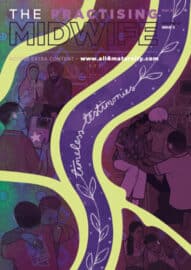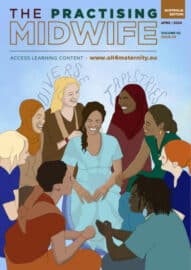The COVID-19 Cohorts: Real-life accounts of being a student midwife during the COVID-19 pandemic
Series curator: Alicia Burnett – Third year student midwife. Social media: @ABurnett_RM on Twitter.
COVID-19: a global pandemic

The World Health Organization (WHO) declared COVID-19 a global pandemic on the 11th of March 2020.1 Due to the outbreak, maternity services are under more scrutiny than ever2 and as a result, student midwives are facing unprecedented pressures in both their personal lives and midwifery education. From being withdrawn from clinical practice to adapting to remote learning and opting in or out of extended clinical placements, the landscape of midwifery education in the UK has drastically changed.
Uniting the global voices of student midwives
 The impact of these changes on the physical and psychological wellbeing of the UK’s trainee midwives is conspicuous on social media and in the group chats of midwifery students across the nation. However, there is a distinct lack of a coordinated, dedicated forum for the UK’s sizeable student midwife population to communally share their experiences. Moreover, from the perspective of a single student without connections to student midwives in other countries, it is unclear how the rapidly unfolding events of the novel coronavirus are affecting student midwives in other parts of the world. And whilst the voices of the approximately 6,500 student midwives in England3 are equally valid, the international reach and sequelae of COVID-19 demands that the voices of students in other nations are given a platform too. Collating the experiences of student midwives from other parts of the world in this blog, would achieve the aim of creating such a platform, whilst effectively building and strengthening global student networks.
The impact of these changes on the physical and psychological wellbeing of the UK’s trainee midwives is conspicuous on social media and in the group chats of midwifery students across the nation. However, there is a distinct lack of a coordinated, dedicated forum for the UK’s sizeable student midwife population to communally share their experiences. Moreover, from the perspective of a single student without connections to student midwives in other countries, it is unclear how the rapidly unfolding events of the novel coronavirus are affecting student midwives in other parts of the world. And whilst the voices of the approximately 6,500 student midwives in England3 are equally valid, the international reach and sequelae of COVID-19 demands that the voices of students in other nations are given a platform too. Collating the experiences of student midwives from other parts of the world in this blog, would achieve the aim of creating such a platform, whilst effectively building and strengthening global student networks.
Recognition for student midwives

A further rationale for The COVID-19 Cohorts blog series is to raise the profile of the hard work and challenges being faced by student midwives during the pandemic. Concerns have been raised about the supply of personal protective equipment (PPE) for midwives and students.4 Furthermore, because of the current state of emergency and the subsequent cascade of rapidly changing events, there have been understandable delays in information provision about what midwifery education will look like in the upcoming months, so healthcare students have experienced anxiety surrounding the future of their course.
Extensive changes
 The changes to UK midwifery education have been extensive. Under new Nursing and Midwifery Council (NMC)5 emergency programme standards, nursing students in the final six months of their programme may be invited to join a temporary emergency COVID-19 register, whilst this opportunity will not be extended to student midwives. Alternatively, some midwifery students (as well as student nurses) have been required to discontinue all clinical practice, whilst others have been invited to opt-in or opt-out of spending up to 80% of the academic year in clinical practice in addition to accessing remote learning; or spending the final six months of their training on an extended placement. Moreover, in some cases, deferred students’ return to their course has been delayed, and students that have opted-out of clinical practice for family, health or other reasons, are unable to undertake the clinical practice hours required for registration until the state of emergency is over — and of course, no-one knows when that will be.
The changes to UK midwifery education have been extensive. Under new Nursing and Midwifery Council (NMC)5 emergency programme standards, nursing students in the final six months of their programme may be invited to join a temporary emergency COVID-19 register, whilst this opportunity will not be extended to student midwives. Alternatively, some midwifery students (as well as student nurses) have been required to discontinue all clinical practice, whilst others have been invited to opt-in or opt-out of spending up to 80% of the academic year in clinical practice in addition to accessing remote learning; or spending the final six months of their training on an extended placement. Moreover, in some cases, deferred students’ return to their course has been delayed, and students that have opted-out of clinical practice for family, health or other reasons, are unable to undertake the clinical practice hours required for registration until the state of emergency is over — and of course, no-one knows when that will be.
The COVID-19 Cohorts blog is an opportunity for students to communicate their thoughts and feelings about these changes.
A moment in history
The COVID-19 Cohorts blog will document the ongoing events of the pandemic, in particular, their impact on student midwives. The novel coronavirus may mean that future maternity services look very different to how they have in the past. For example, the Royal College of Obstetricians and Gynaecologists (RCOG)6 now recommends that units include COVID-19 scenarios in simulation sessions, and homebirths have been suspended in several Trusts.7 The COVID-19 Cohorts blog will capture these historic events so we can better understand why prospective maternity services function the way they do, and once the pandemic has passed, student midwives can see how far they have come.
 Thank you
Thank you
Finally, I would like to take this opportunity to express my gratitude for the hard work of midwifery lecturers, midwives, clinical practice areas, clinical practice facilitator, All4Maternity, Maternity & Midwifery Forum, the Council of Deans of Health, the NMC, Health Education England, the Royal College of Midwives (RCM) and Chief Midwifery Officer for England Professor Jacqueline Dunkley-Bent, for the guidance, support and care you continue to extend to student midwives.
Love and wellbeing to all,
Alicia
- World Health Organization (WHO). General’s opening remarks at the media briefing on Covid-19 – 11 March 2020. WHO Director-General. https://www.who.int/dg/speeches/detail/who-director-general-s-opening-remarks-at-the-media-briefing-on-covid-19—11-march-2020. Published April 11, 2020. Accessed: April 5th, 2020.
- Grace, N. Birth companions in the time of covid-19. Birthing with Grace. https://birthingwithgrace.co.uk/birth-companions-in-the-time-of-covid-19/. Published March 15th 2020. Accessed: April 4th 2020.
- The Royal College of Midwives. State of maternity services report 2018 – England. https://www.rcm.org.uk/media/2373/state-of-maternity-services-report-2018-england.pdf. Published 2018. Accessed April 4th, 2020.
- The Royal College of Midwives (2020). RCM expresses concern at supply of personal protection equipment for midwives. https://www.rcm.org.uk/media-releases/2020/march/rcm-expresses-concern-at-supply-of-personal-protection-equipment-for-midwives/
- Nursing and Midwifery Council. Information for students and educators. Coronavirus (Covid-19): Information and advice. https://www.nmc.org.uk/news/coronavirus/information-for-students-and-educators/. Updated April 6th, 2020. Accessed April 6th, 2020.
- Royal College of Obstetricians and Gynaecologists (RCOG). RCOG staffing options for obstetrics and gynaecology services during COVID-19 pandemic. Coronavirus (COVID-19) infection and pregnancy. https://www.rcog.org.uk/en/guidelines-research-services/guidelines/coronavirus-pregnancy/rcog-staffing-options-for-obstetrics-and-gynaecology-services-during-covid-19-pandemic/. Published 2020. Accessed April 6th, 2020.
- Morris, N. Home births will likely need to be cancelled because of coronavirus. The Metro. https://metro.co.uk/2020/04/01/home-births-will-likely-need-cancelled-coronavirus-12490909/. Published April 1st, 2020. Accessed April 6th, 2020.







